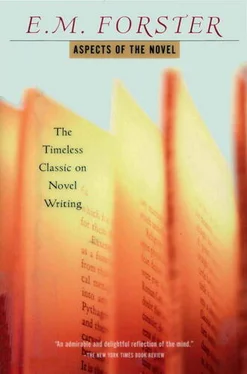Death. The treatment of death, on the other hand, is nourished much more on observation, and has a variety about it which suggests that the novelist finds it congenial. He does, for the reason that death ends a book neatly, and for the less obvious reason that working as he does in time he finds it easier to work from the known towards the darkness rather than from the darkness of birth towards the known. By the time his characters die, he understands them; he can be both appropriate and imaginative about them—strongest of combinations. Take a little death —the death of Mrs. Proudie in the Last Chronicle of Barset. All is in keeping, yet the effect is terrifying, because Trollope has ambled Mrs. Proudie down many a diocesan bypath, showing her paces, making her snap, accustoming us, even to boredom, to her character and tricks, to her "Bishop, consider the souls of the people," and then she has a heart attack by the edge of her bed, she has ambled far enough— end of Mrs. Proudie. There is scarcely anything that the novelist cannot borrow from "daily death"; scarcely anything he may not profitably invent. The doors of that darkness lie open to him and he can even follow his characters through it, provided he is shod with imagination and does not try to bring us back scraps of séance information about the "life beyond."
What of food, the third fact upon our list? Food in fiction is mainly social. It draws characters together, but they seldom require it physiologically, seldom enjoy it, and never digest it unless specially asked to do so. They hunger for each other, as we do in life, but our equally constant longing for breakfast and Junch does not get reflected. Even poetry has made more of it—at least of its aesthetic side. Milton and Keats have both come nearer to the sensuousness of swallowing than George Meredith.
Sleep. Also perfunctory. No attempt to indicate oblivion or the actual dream world. Dreams are either logical or else mosaics made out of hard little fragments of the past and future. They are introduced with a purpose and that purpose is not the character's life as a whole, but that part of it he lives while awake. He is never conceived as a creature, a third of whose time is spent in the darkness. It is the limited daylight vision of the historian, which the novelist elsewhere avoids. Why should he not understand or reconstruct sleep? For remember, he has the right to invent, and we know when he is inventing truly, because his passion floats us over improbabilities. Yet he has neither copied sleep nor created it. It is just an amalgam.
Love. You all know how enormously love bulks in novels, and will probably agree with me that it has done them harm and made them monotonous. Why has this particular experience, especially in its sex form, been transplanted in such generous quantities? If you think of a novel in the vague you think of a love interest—of a man and woman who want to be united and perhaps succeed. If you think of your own life in the vague, or of a group of lives, you are left with a very different and a more complex impression.
There would seem to be two reasons why love, even in good sincere novels, is unduly prominent.
Firstly, when the novelist ceases to design his characters and begins to create them—"love" in any or all of its aspects becomes important in his mind, and without intending to do so he makes his characters unduly sensitive to it—unduly in the sense that they would not trouble so much in life. The constant sensitiveness of characters for each other—even in writers called robust, like Fielding—is remarkable, and has no parallel in life, except among people who have plenty of leisure. Passion, intensity at moments—yes, but not this constant awareness, this endless readjusting, this ceaseless hunger. I believe that these are the reflections of the novelist's own state of mind while he composes, and that the predominance of love in novels is partly because of this.
A second reason; which logically comes into another part of our inquiry, but it shall be noted here. Love, like death, is congenial to a novelist because it ends a book conveniently. He can make it a permanency, and his readers easily acquiesce, because one of the illusions attached to love is that it will be permanent. Not has been—will be. All history, all our experience, teaches us that no human relationship is constant, it is as unstable as the living beings who compose it, and they must balance like jugglers if it is to remain; if it is constant it is no longer a human relationship but a social habit, the emphasis in it has passed from love to marriage. All this we know, yet we cannot bear to apply our bitter knowledge to the future; the future is to be so different; the perfect person is to come along, or the person we know already is to become perfect. There are to be no changes, no necessity for alertness. We are to be happy or even perhaps miserable for ever and ever. Any strong emotion brings with it the illusion of permanence, and the novelists have seized upon this. They usually end their books with marriage, and we do not object because we lend them our dreams.
Here we must conclude our comparison of those two allied species, homo sapiens and homo fictus. Homo fictus is more elusive than his cousin. He is created in the minds of hundreds of different novelists, who have conflicting methods of gestation, so one must not generalize. Still, one can say a little about him. He is generally born off, he is capable of dying on, he wants little food or sleep, he is tirelessly occupied with human relationships. And—most important—we can know more about him than we can know about any of our fellow creatures, because his creator and narrator are one. Were we equipped for hyperbole we might exclaim at this point: "If God could tell the story of the Universe, the Universe would become fictitious."
For this is the principle involved.
Let us, after these high speculations, take an easy character and study it for a little. Moll Flanders will do. She fills the book that bears her name, or rather stands alone in it, like a tree in a park, so that we can see her from every aspect and are not bothered by rival growths. Defoe is telling a story, like Scott, and we shall find stray threads left about in much the same way, on the chance of the writer wanting to pick them up afterwards: Moll's early batch of children for instance. But the parallel between Scott and Defoe cannot be pressed. What interested Defoe was the heroine, and the form of his book proceeds naturally out of her character. Seduced by a younger brother and married to an elder, she takes to husbands in the earlier and brighter part of her career: not to prostitution, which she detests with all the force of a decent and affectionate heart. She and most of the characters in Defoe's underworld are kind to one another, they save each other's feelings and run risks through personal loyalty. Their innate goodness is always flourishing despite the author's better judgment, the reason evidently being that the author had some great experience himself while in Newgate. We do not know what it was, probably he himself did not know afterwards, for he was a busy slipshod journalist and a keen politician. But something occurred to him in prison, and out of its vague, powerful emotion Moll and Roxana are born. Moll is a character physically, with hard plump limbs that get into bed and pick pockets. She lays no stress upon her appearance, yet she moves us as having height and weight, as breathing and eating, and doing many of the things that are usually missed out. Husbands were her earlier employ: she was trigamous if not quadrigamous, and one of her husbands turned out to be a brother. She was happy with all of them, they were nice to her, she nice to them. Listen to the pleasant jaunt her draper husband took her on—she never cared for him much.
Читать дальше












